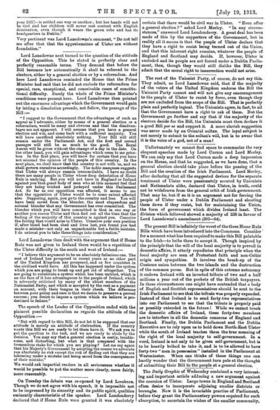Lord Lansdowne next turned to the question of the attitude
of the Opposition. This he stated in perfectly clear and perfectly reasonable terms. They demand that before the Bill becomes law automatically it shall be referred to the electors, either by a general election or by a referendum. And here Lord Lansdowne reminded the House that the Prime Minister had said that he did not exclude the referendum for special, rare, exceptional, and conceivable cases of constitu- tional difficulty. Surely the whole of the Prime Minister's conditions were present here. Lord Lansdowne then pointed out the enormous advantage which the Government would gain by letting a dissolution precede, not follow, the passage of the Bill :-
" I suggest to the Government that the advantages of such an appeal as I advocate, either by means of a general election or a referendum, would be many and obvious and that the disadvan- tages are not apparent. I will assume that you have a general election and win, and come back with a sufficient majority. You will have sacrificed absolutely nothing. Your Bill will still remain under the Parliament Act, and the first and second passages will still be so much to the good. The Royal Assent will be given without the change of a day in the date. On the other hand, you will gain advantages which seem to me price- less. In the first place, you will know for certain that you have not misread the opinion of the people of this country. In the next place, we shall know that the country is not with us, and we shall govern ourselves accordingly. The noble marquess suggests that Ulster will always remain irreconcilable. I have no doubt there are many people in Ulster whose deep detestation of Home Rule is undying. But you will not have in England or Ireland against you that great body of men who at this moment feel that they are being tricked and jockeyed under this Parliament Act. So far as our opposition was affected, it seems to me that the opposition of Ulster would be to some extent affected also. Supposing, again, you go to the country and lose. You will have been saved from the blunder, the most stupendous and colossal blunder that any Government has ever committed. The blunder which you will have committed is that in one way or another you coerce Ulster and then find out all the time that the feeling of the majority of this country is against you. Conceive the feeling that would arise in Ulster. Conceive your own position if, after blood had been shed and lives lost, you found you had made a mistake—not only an unpardonable but a futile mistake. I do entreat you to take these things into consideration."










































 Previous page
Previous page